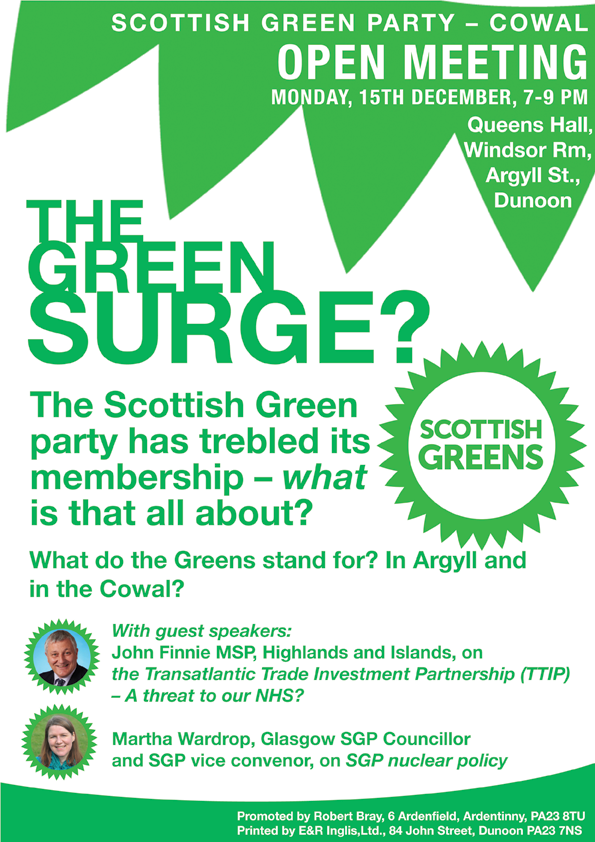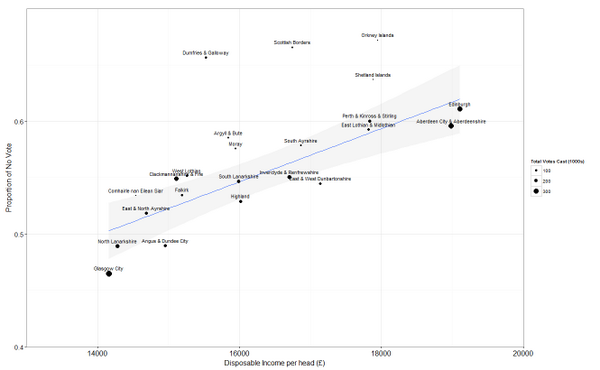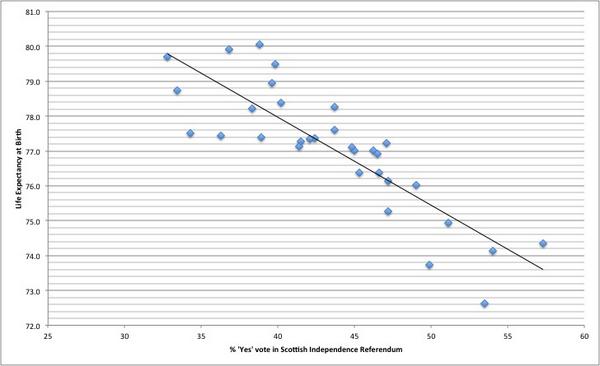Looking forward to this and also had a lot of fun designing the poster too –
These graphs relate two metrics, life expectancy and income, with how people voted. In all four cases of the councils which voted Yes have the lowest levels of both. If anything, this proves to me that the Yes vote was effectively saying, “the system is broken – we need to change the system”.


The thinking behind the graphs is available on twitter, at the accounts shown.
Not much more needs to be said, I think.
UPDATE: Actually, this from Mike Russell which is published in the Sunday Times today.
The Guardian published a series of short opinion pieces by a variety of writers on how they regard Independence. Really. Very. Interesting – whether you agree with Irvine or not.
Aside from Irvine what struck me was the following by Richard Holloway. It articulates exactly how I have felt about the entire debate.
I agree with the priest in TS Eliot’s Murder in the Cathedral who said he saw “nothing quite conclusive in the art of temporal government”. Economics strikes me as no more conclusive a science than theology, which is why I have been more irritated than enlightened by the use each side has made of the dismal science in the debate; but while the arguments of the yes side may not have persuaded me, the arguments of the no side have propelled me in the opposite direction. Rather than making a positive case for the union, the Better Together campaign has wasted its energy on attacking the idea that Scotland could go it alone, a tactic guaranteed to anger those of us for whom the question was never whether we could but whether we should.
And then I think, none of us will ever know which way we should go, even if it was possible to have all the best available advice, because we’ll only ever test one post-referendum reality – the other will lie discarded, untested, on the other side of the 18th September forever.
The article is here.
Had to share this article in Saturday’s Guardian, which was in turn inspired by J. K. Rowling’s recent donation to the Better Together campaign. A really interesting take on what is going on – and right in line with Angus Reid’s Modest Proposal which speaks to, in my mind anyway, the UK’s present democratic deficit.
A Modest Proposal
from the poem, Call for a Constitutionif I as a writer of poetry
were called upon to give a form of words
to model the nation’s behaviour
it would be this: ownership obliges
everyone to respect and to care for
the sacred; to respect and to care for
freedom of conscience; and to recognise
the gift of every individual
to respect it, care for it, nourish it;
to respect and to care for communities;
and to care for the land, and wherever
the land has been abused to restore it
so that it can support all forms of life:
five principles, five fingers on the hand.
NB. Just realised appropos the above, today’s the day when the Scottish Gov’t published its consultation on a constitution. Not as poetic, but I really liked the idea of popular sovereignty – we’re all our own rulers. Heady stuff – a lot to be admired, a lot to be discussed …
Here’s the comment I have just posted in the comments section:
Thanks George you have articulated why I’ll be voting for Independence. Communities across Scotland are already using the first Land Reform act to access the right to buy when estates and land come up for sale. Its an arduous process, but for many one which brings manifold benefits – look at Sleat, Northwest Mull, Kilfinan and even our community in Glendaruel. Once communities in Scotland had no chance of owning anything, surrounded as they were by the huge landowners you describe, now at least they have a chance. Independence is seen at a non-partisan level as the opportunity to drive forward the type of reforms Andy Wightman talks about, the sort of reforms which will never be fully available to us under the Union.
The article is here
The picture is a panorama of Stronafian Forest which the Colintraive and Glendaruel Development Trust bought in February 2013.
Today in the Guardian, Bella Bathurst concludes:
“In all the different Scotlands, one image always recurs: that of a marriage. Just for the sake of it, let’s pretend that there’s this couple, Albion and Caledonia. They’ve been married for a long time – more than 300 years – and it’s been a productive but troubled relationship. Albion is happy with things as they are, but Caledonia wants to leave. Albion flirts with other countries and Caledonia feels bullied. When Caledonia threatens to walk out, Albion reminds her of all the things she’ll lose: the house, furniture, money, security, music, pictures. Which only makes Caledonia more determined to go. Her blood is up, she’s made plans, she’s sure she’ll get by somehow. All of us – English, Scottish, Welsh, Irish, whether we have a vote in the referendum or not – get to be counsellors on this. So what chance would you give them?”
I had to read this three times to believe that this national newspaper would characterise the vote in Scotland on Independence like this. Smacks of petulance, not a respect for democracy.
http://www.theguardian.com/politics/2014/mar/18/scottish-independence-scotland
In my view, Land Reform, community ownership of assets and independence are the right way to go. There’ll be uncertainty, there’ll be change, but if we wish to have a happy, vibrant, civilised country which makes its own decisions then it has to be a Yes.